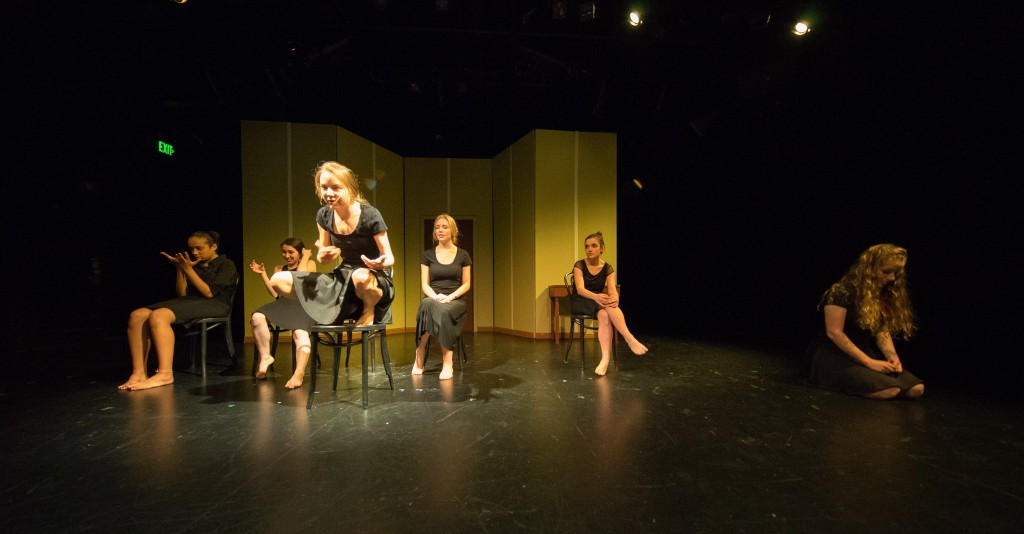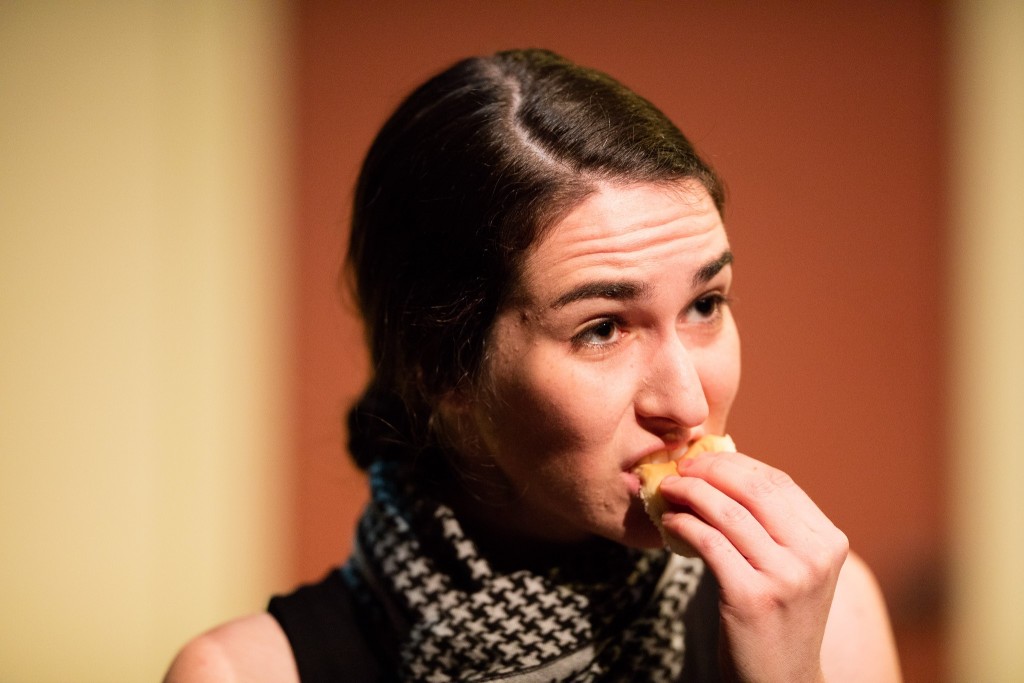
Directed by Audrey Moyce and produced by Elizabeth Knarr, Analyssa Lopez, and Louis McWilliams in conjunction with Glengarry Glen Ross for their TAPS Capstone Project, Top Girls in a class of its own. As trite as that statement can be, it actually rings true for this snappy, slightly nonlinear, intense examination of the reworking of femininity in 1980s Britain. While Top Girls focuses heavily on the trope of the working woman, it is far from cliche; it’s novel, fast-paced, and strangely contemporary despite being written for a society thirty years past. And, of course, the five-woman cast of Top Girls is nothing short of phenomenal.
The opening scene, a strange, dreamlike dinner party between classic working woman Marlene (Davis Leonard) and four mythical, historical, or fantastical women who suffered through misogynist adversity, sets the tone for the rest of the show with its snappy dialogue and feminist themes. Leonard’s Marlene begins the show poised and polished, the picture perfect stereotype of the fierce working woman but slowly unravels during certain scenes, yet she does not do so too suddenly or too emotionally. Even when she’s crying on a kitchen counter next to a whiskey bottle, Leonard still maintains a semblance of dignity, grace, and power, balancing the emotional nuances of her character expertly.
The mythical/historical/fantastical female figures that begin the show alongside the polished Marlene include Pope Joan (Lillian Bornstein), Isabella Bird (Benina Stern), Lady Nijo (Gianna Clark), Dull Gret (Lea Zawada), and Patient Griselda (Sarah Mergen), five incredibly powerful women who still hold their societal contexts in their beliefs, narratives, and dialogue. The way these women speak, interconnecting their words, cutting each other off abruptly without any awkward moments’ pause, bringing in new ideas to create a natural conversational flow, showcases nearly professional mastery of the script from which these words originated. There is rarely a dull moment during this opening scene, and when silence appears, it is calculated and meaningful; whether it’s when we hear Lady Nijo break down in tears over the loss of her children or Pope Joan recount her death by stoning, the show always makes sure to give us a break in which to collect our thoughts and move onwards with its incredibly fast pace. Each woman is the same, yet incredibly different, in her mannerisms and speech; although they are all speaking loudly and confidently throughout the scene (with the exception of Dull Gret, who remains mostly silent), their nuances reflect each of their powerful backstory. From Stern’s high-pitched giggle, perpetually tilted head and lady-like crossed legs and Mergen’s soft, poised, feminine stance to Bornstein’s strong posture reminiscent of a king sitting upon a throne and Clark’s complacent hands sitting obediently in her lap, each actress is unique in her own portrayal of such intense feminist figures.

The rest of the show follows Marlene’s struggles as a powerful woman in a largely male-dominated society, and Marlene’s niece Angie (Lea Zawada) as she struggles to discover her place in a world (and with a mother (Lillian Bornstein)) that deems her too stupid to succeed in a world where a woman has to be a “ballbreaker” to get ahead. Zawada’s Angie is a brilliant foil to Leonard’s Marlene, in that she is as slow and deliberate as Marlene is fast and snappy; Zawada is careful, speaking in low tones and communicating her so-called dimwittedness with her hunched shoulders, childlike vacant stare, and temperamental nature. Zawada can express a range of emotions from too high excitement to too violent rage in the space of a five minute scene; as arguably the most pivotal character in Top Girls, her repertoire brings energy, reality, and originality to a story that would have been too trite had it only followed the working woman.
Lillian Bornstein as Marlene’s sister and Angie’s mother Joyce also shines in her performance. She stands tall, yet weary; you can see it in the way her face settles into the lines of hard work, her brow furrowed, lips pursed, hands on hips and back slouched as if aching for a break. She’s angry, loud, brash, yet highly emotional and sensitive. Bornstein brings to the role a maturity far beyond her years, and she exudes the spirit (or lack thereof) of Joyce with every line she utters.
Tender, yet brash. Soft, yet rough. Slow, yet fast. Top Girls is full of these dichotomies, constantly questioning the emotional binary that separates genders and breaking down the stereotypes brought forth by these. Far from a stereotypical tale about a business-minded woman, Top Girls is unique, emotional, and real. Not natural, but in the best way possible.
Photo courtesy of Frank Chen.
Top Girls. November 11-14. Tickets here.
